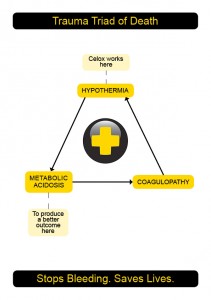It’s 100 F outside, beware of hypothermia
In this Celox blog post, we’re exploring the challenge of the ‘Lethal Triad ’…
When experiencing a trauma, severe blood loss can quickly lead to the victim becoming hypothermic, regardless of the temperature. The Lethal Triad represents a potentially fatal challenge in trauma, causing organ damage and complications in treating the casualty. In this blog we’ll talk through the cycle of damage and what it means.
In the triad, there are several effects all going on at once, essentially the uncontrolled bleeding causes drop in body temperature and a lack of oxygen around the body. These both affect the ability to form and keep robust blood clots, leading to more bleeding.
The blood loss leads to the victim’s blood pressure dropping. As blood pressure drops vasoconstriction (squeezing vessels) takes place to compensate and conserve blood in the core. This limits the blood flow around the body. The casualty, probably lying down, is continually losing heat through to the ground and the air. Even in hot climates this combination very quickly leads to hypothermia. The numbers of people affected is quoted to be between 42% to 66%.
Hypothermia reduces the blood’s ability to make fibrinogen that is needed to initiate clotting. It also alters the rate at which other key enzymes work, which also slows down or prevents strogn clot formation.
At the same time the reduced supply of red blood cells means that less oxygen is carried to the tissues and less CO2 is transported away. This changes the acidity in the blood and organs, becoming more acidic once 20 % of the blood volume is lost – “acidosis”. The acidic environment inhibits some of the blood clotting factors, it helps to breaks down fibrinogen that is needed to form clots and ultimately damages organs such as the kidney and brain, chemically, but also because of physical swelling in the brain. Aggressive resuscitation with normal saline (with an acidic pH 5.5) can make this worse, as well as diluting the blood further.
So in short, both acidosis and hypothermia contribute to Coagulopathy – the inability to clot normally. This means that there is a cycle of these three effects becoming progressively harder to reverse.
Once the lethal triad is established, then it is likely that complex hospital treatment is required to treat the damaged kidneys, brain and other affected organs. If the triad can be prevented this is far preferable. Simple measures include keeping the casualty warm and conserving as much blood in the patient as possible. Celox contributes by working to stop bleeding as fast as possible, with as little blood loss as possible. It will work even when the patient is becoming hypothermic.
Modern damage control resuscitation methods are also critical to prevent the lethal triad, but it is a huge subject and we will not try to go into that here. To summarise, prevention is definitely better than treatment in this case. Keep the patient warm, and minimise blood loss. Follow this link to see how Celox works. https://www.celoxmedical.com/int/resources/how-celox-works/
Our next blog will look at the UK Ambulance Services new protocol for catastrophic bleeding.
Thanks for reading,
The Celox Team
The Celox Team
Click on image to expand
Further reading:
- Incidence and Timing of Hypothermia in trauma Patients Undergoing Operations. Gregory JS et al. J Traum 1991,31:795-800.
- Dawes R and Thomas R. Battlefield resuscitation. Current Opinion in Critical Care 2009, 15:527-535.
- Brohi K, et al. Acute Coagulopathy of trauma: mechanism, identification and effect. Curr Opin Crit Care. 2007 Dec;13(6):680-5.



